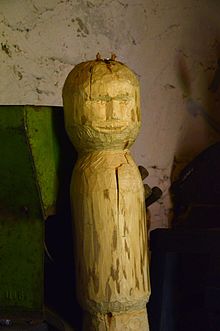Peko
Peko ( Estonian ; Finnish Pekko , Pellon Pekko or Pellonpekko = "field pekko") in Estonian and Finnish mythology denotes the god of the field and fertility, especially brewing beer and barley .
meaning
The pre-Christian cult around the fertility god Peko was particularly lively among the Orthodox Finno-Ugric people of the Setukese in today's southern Estonia and in the area around the Russian city of Pechory until the 20th century.
The god is considered to be one of the most important elements of the Setukesian culture. The Setucese revered him as a "king", national hero and national symbol. The traditionally elected King of the Setu people sees himself as a representative of Pekos on earth.
history
Peko was first mentioned in 1551 by the Finnish reformer Mikael Agricola as the god of Karelians . Peko is also associated with the Estonian god of thunder Pikne (Pitkne) and the Baltic god of thunder Perkūnas .
cult
The common main cult is divided into a spring and an autumn festival. Before the Pentecost celebrations , the young adult Setu people held a ritual battle before sunrise until the first drop of blood flowed. The first to be injured became the guest of honor at next year's festival. The second celebrations in honor of the peko were held after the harvest . Older men made offerings. The common formula was "peko, peko, come to drink the beer". For the veneration of Pekos, however, were also throughout the year, u. a. held at Candlemas and at the Midsummer Festival, ritual meetings.
Especially wooden figures of the pekos were an important part of the peko cult. (Black) candles were lit in his honor. The wooden images of Pekos usually had holes for candles on the top. The Setu people kept carved idols of Peko in the granaries - mostly protected from prying eyes.
National epic
Peko is also the name of the Setukese national epic created in 1927 . The initiator was the folklorist Paulopriit Voolaine (1899–1985), who worked closely with the most famous Setukese folk singer Anne Vabarna (1877–1964) to create it.
literature
- Suhonen, Seppo. Pekko. Helsinki: Suomalaisen Kirjallisuuden Seura 2006
- Peko. Setu rahvuseepos. Setukai Epic. The Setu Epic. Laulanut-Laulnud-Sung by Anne Vabarna. Toimittaneet-toimetanud-edited by Paul Hagu & Seppo Suhonen. Kuopio 1995.
See also
Web links
- Figure of a wooden peko (Estonian National Museum Tartu)
- About Peko (Estonian)
